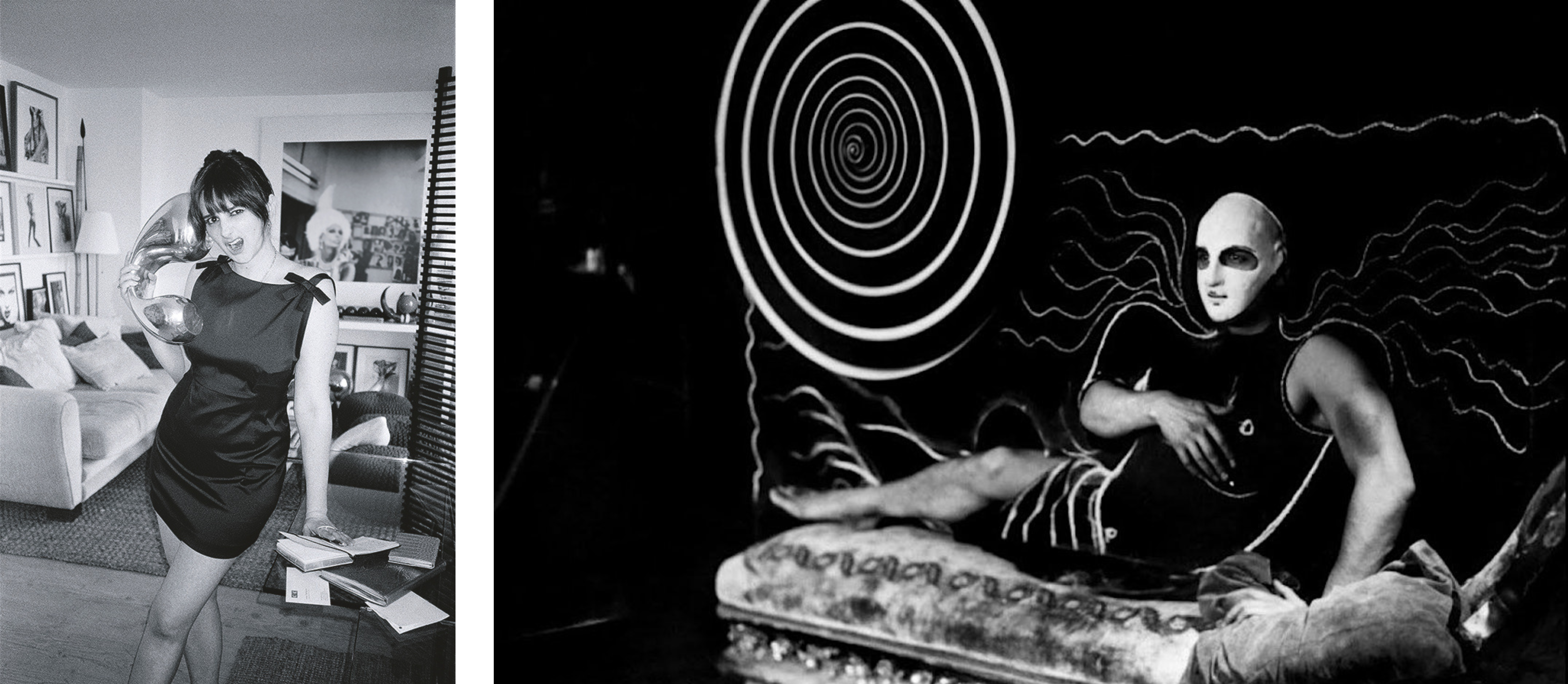FOR IMMEDIATE RELEASE
August 2024
Jean Cocteau’s The Blood of a Poet (1932): A Screening and Conversation with SACRED MONSTER founder Chloë Cassens and Surrealist Study Group at Philosophical Research Society
Celebrating and discussing the still-controversial avant-garde classic

Left photo: Chloë Cassens, courtesy Frédéric Tröhler. Right photo: courtesy Philosophical Research Society
Link to purchase tickets ($10)
Los Angeles, CA – The Philosophical Research Society (PRS) hosts a screening of Jean Cocteau’s revolutionary first film, The Blood of a Poet (1932) on Wednesday, September 4th, 7:00 – 9:00 PM. The film will be followed by an in-depth discussion about Jean Cocteau’s groundbreaking work between Chloë Cassens, the founder of SACRED MONSTER and the representative of the Severin Wunderman Collection, which is the largest collection in the world of works by Cocteau, and dama, who is an artist, curator, a librarian at PRS, and the host of their Surrealist Study Group (SSG).
The Blood of a Poet was extremely controversial when it was first released in 1932, and many critics disparaged it as unserious. Today, it’s a celebrated avant-garde classic and one of the most important films in cinema history. Cocteau, who was involved with the Fauvists, Dadaists, Surrealists, Modernists, the Ballet Russes, and the Avant-Garde, has influenced generations of thinkers and creatives like Chloë Cassens, dama, and probably you, too (even if you don’t know it yet).
Cassens and dama will add contemporary reverence and relevance to this iconic film, using it as a catalyst for broader historical and cultural analyses. They’ll dish on the legends, scandals, and secret history of Cocteau’s life and work, his relationship to the surrealist movement, and the creation and lasting impact of Cocteau’s groundbreaking first film. The conversation will take on a similar tone to SACRED MONSTER, Cassens’ educational essay project examining how Cocteau continues to influence contemporary art and culture with his transgressive, unabashedly queer and boundary-breaking work.
“We wring our hands over ‘unprecedented events,’” writes Cassens, “but any good student of the humanities will tell you that rarely has something never happened before. And in our current culture, we have only to look back some hundred years, to Cocteau and Bernhardt and their ilk, to see reflected back to us our own challenging times.”
ABOUT THE BLOOD OF A POET (Le sang d’un poète)
“Poets . . . shed not only the red blood of their hearts but the white blood of their souls,” proclaimed Jean Cocteau of The Blood of a Poet (Le sang d’un poète), his groundbreaking first film—an exploration of the plight of the artist, the power of metaphor and the relationship between art and dreams. Told in four episodes, the film begins with an artist in his studio startled to find a mouth he has painted beginning to move. From this point, the film moves between dimensions and settings, offering disturbing images, dense with interpretive possibilities. With this, his premiere feature, The Blood of a Poet suggests the virtuosic command of the form that would later define Cocteau’s entire body of work. One of cinema’s great experiments, this first installment of his “Orphic Trilogy” stretches the medium to its limits in an effort to capture the poet’s obsession with the struggle between the forces of life and death.
Dir. Jean Cocteau, France, 1932, 55 mins, B&W, French w/ English Subtitles, Digital.
ABOUT CHLOË CASSENS
Chloë Cassens is the representative of the Severin Wunderman Collection, the largest in the world of works by iconoclastic French artist Jean Cocteau. It makes up the entirety of the contents of the Musée Jean Cocteau-collection Severin Wunderman in Menton, France. She is a longtime scholar of Cocteau with a unique perspective, as she is Wunderman’s granddaughter. Based in Los Angeles, she was raised between LA, Switzerland and France before receiving her BA in Comparative Literature from Barnard College. She is the author of SACRED MONSTER, a biweekly essay project dedicated to celebrating Cocteau and the Collection. As the Collection’s representative, she works to educate others about Wunderman’s legacy and popularize Cocteau’s work around the globe.
Instagram: @chloecassens
Website: chloecassens.com
Sacred Monster website: https://www.sacred-monster.com/
ABOUT dama
Amanda Maciel Antunes (aka dama) is a Brazilian artist based in Los Angeles. Her auto-didactic and transdisciplinary practice merges language and durational performance to create site-specific works. She works in collaboration with public libraries, nature and communal spaces, reflecting on the selective nature of memory, inherent language and anthropological references written by women as points of departure.
Sites of practice have included a former WWII military shelter in East LA, Sæborg historical theatre in a northern fjord, Iceland, The Crowley Theatre in Marfa, TX; a Dessana Tribe territory in Rio Negro, Brazil; the Los Angeles National Forest; and the High Desert of California. She has exhibited her work in the USA, Brazil and Iceland. Recent select exhibitions and solo performances at Galeria Vermelho, Galeria Chão, Wignall Museum, Track16 Gallery, Irrational Exhibits, 18th Street Arts Center, Oregon Contemporary, Brand Art Library, Irvine Fine Arts Center, Philosophical Research Society. Her first book titled Second Birth was published in the Spring of 2023 by HEXENTEXTE. dama is a librarian at the Philosophical Research Society in Los Angeles where she also curates and hosts a monthly Surrealist Study Group focusing on women authors and artists in conversation.
Instagram: @amandamacielantunes
Website: amandamacielantunes.net
ABOUT PHILOSOPHICAL RESEARCH SOCIETY
The Philosophical Research Society in Los Angeles is a nonprofit cultural and educational organization which presents concerts, film screenings, lectures, performance art and theatre events, gallery exhibits and more on the intersection between the creative arts and mythology, mysticism and metaphysics.
Instagram: @philosophical_research_society
Website: https://www.prs.org/
